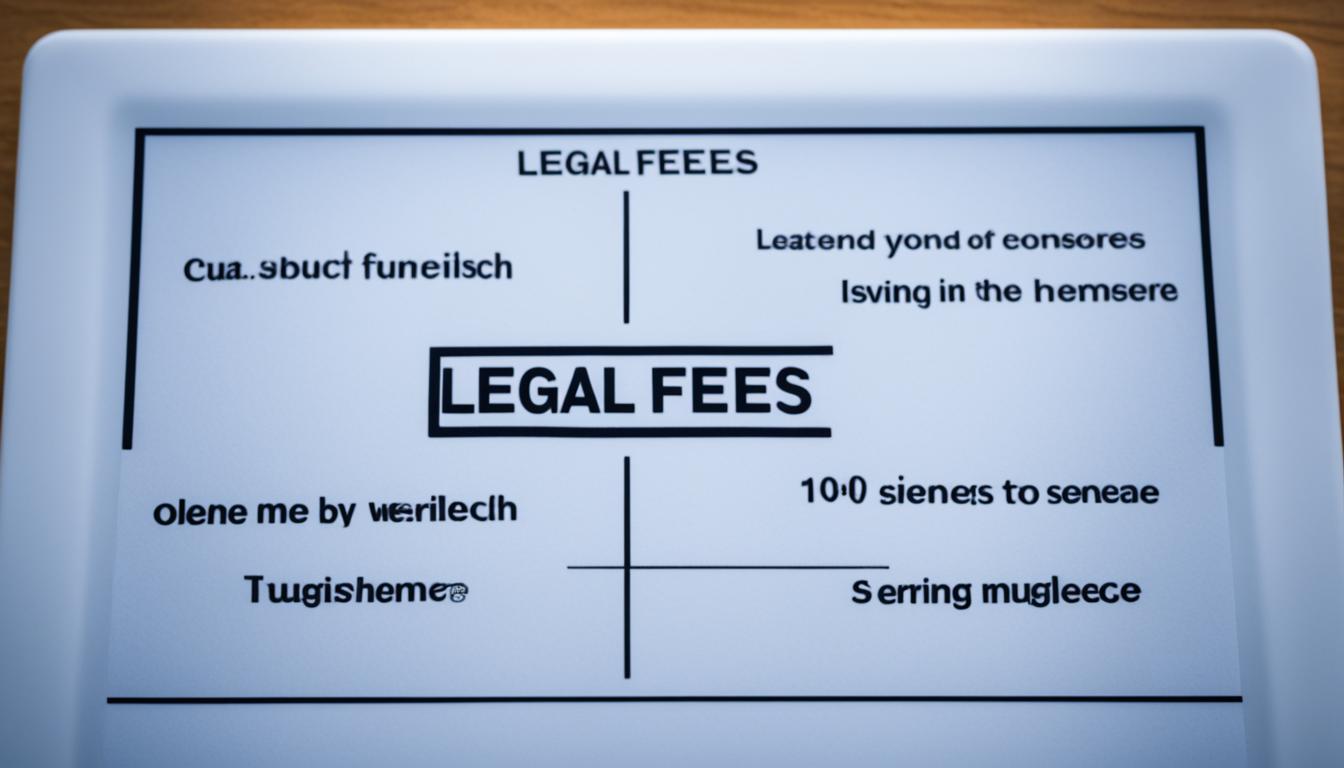Deciding to sue someone means thinking about costs. The cost to sue someone changes a lot. It depends on the case, the fees, and if insurance is involved. It’s very important to know these costs first. This is because legal fees for lawsuits can climb fast and affect the result.
Many factors affect the cost of filing a lawsuit. These include attorney’s fees for litigation and lawsuit expenses. The price of taking legal action can seem high. But, it’s important to handle it right for the best result. This guide will cover the lawsuit filing costs and expense of suing someone. It will give you a full look at the financial implications of lawsuits.
The Contingency Fee Model
The contingency fee model is how personal injury lawyers work. With this, clients don’t pay at the start. The lawyer’s fee is part of the final settlement or court award, usually about one-third. This way, personal injury victims can start their case without money upfront.
Understanding the Personal Injury Lawyer’s Payment Structure
Personal injury lawyers under the contingency model only get paid if they win. They may get up to 40% of the settlement. This makes the lawyer really work hard to win and get the client a big recovery.
How Contingency Fees Work
This model helps injury victims get a lawyer without worry about money right away. If the case wins, the lawyer covers all expenses. Then, they take their fee from the final amount won. If the case is lost, the client doesn’t have to pay the lawyer.
| Statistic | Value |
|---|---|
| Contingency fee agreements involve attorneys receiving a certain percentage of recoverable compensation from a court case. | – |
| Contingency fees for personal injury lawsuits typically range between 33% and 40% of the settlement amount. | – |
| Lawyers often offer free consultations to evaluate the validity of potential legal claims. | – |
| Court costs and attorney fees may be recovered if a case is won, depending on the nature of the case or statutory laws. | – |
The contingency fee model is great for personal injury victims. It lets them get top legal help without paying first. The lawyer works hard to win because their fee comes from that victory.
Court Costs and Additional Expenses
The way lawyers get paid can help lower the cost at the start. Yet, there are other costs for personal injury cases. This includes filing fees, fees for serving summons, and court reporter fees. Getting evidence, like medical records and expert witness testimony also add to your bills. Victims may also have to pay for copying and postage.
Filing Fees and Mandatory Court Charges
Starting a lawsuit costs money, and it varies by where you are and what your case is about. Filing fees can be a little, like $5, or much more. For example, in Florida, it can be between $300 and $400 in 2023. These costs are just the start of what you might spend on your case.
Discovery Costs and Administrative Fees
Getting ready for the case, like collecting evidence, also adds up. Deposition fees, expert witness expenses, and medical records can be costly. Plus, you have to pay for copying and postage. These costs are all part of the process.

“The costs of civil lawsuits vary widely based on the nature of the lawsuit, desired outcomes, and parties involved.”
Knowing about these extra expenses is very important. Even with lower upfront costs, legal action can still be expensive. This is because of all the fees and charges along the way.
How Much Does It Cost To Sue Someone
Comparing Settlement vs. Trial Costs
Suing someone can be costly. The price changes based on the case’s complex nature, the location, lawyer’s fees, and how long it takes. In personal injury cases, you might not pay at first thanks to arrangements that only charge if you win.
Most injury cases wrap up outside court. This helps cut down on costs. But, if you need to go to trial, costs go up. Additional court time, more investigation, and possible appeals can make it pricier. Some lawyers increase their contingency fees for trials. This is because they put more effort into getting ready.
| Expense | Settlement | Trial |
|---|---|---|
| Attorney Fees | Typically 33% of the settlement | Sliding scale, increasing if the case goes to trial |
| Court Costs | Minimal | Increased due to extended court time and additional discovery costs |
| Expert Witness Fees | Minimal or not required | Increased due to the need for expert testimony at trial |
| Filing Fees | Minimal | Increased due to the filing of additional motions and appeals |
The lawsuit cost changes a lot based on where and how you sue. In the US, many personal injury lawyers only charge you if you win. This makes it easier for you because you don’t pay right away.

Insurance Company Involvement
Insurance companies play a big role in personal injury cases. If the person being sued has insurance, like auto insurance in a car crash, the insurance company usually pays. But these companies are famous for wanting to pay less money. This is where a good personal injury lawyer comes in. They can talk with the insurance company for a fair deal. This negotiation can make a big difference in how much money the lawsuit costs.
Navigating Insurance Claim Complexities
In Texas, suing an insurance company directly isn’t common. You must first make a claim against the other driver. This is because Texas law needs you to show the other driver is at fault before you can ask their insurance to pay. The case law State Farm Cnty. Mut. Ins. Co. of Tex. v. Ollis says you need proof of the other driver’s responsibility. This can come from a court decision or a settlement.
When a hit-and-run driver can’t be found, you might use your own insurance for help. This is under your Uninsured Motorist Bodily Injury coverage. In hit-and-run cases where the driver is found but has no insurance, you might sue your own insurance. This is again under your Uninsured Motorist Bodily Injury coverage. If an uninsured driver hurts you, you could claim against your insurance or the insurance of the car you were in. If many cars are in the accident, figuring out who’s at fault and responsible is tricky but very important in getting the right claims through.
The participation of insurance firms in injury cases can matter a lot. Working with a skilled personal injury lawyer can help make the process smoother. They can help you get a good settlement. This means you’ll get the most money possible from the case.
Filing Lawsuits in Colorado: A Cost Breakdown
In Colorado, where you file your lawsuit affects the cost to start. The choices are County Court (about under $100), District Court (from $200 to $600), and Small Claims Court (usually under $50 for up to $7,500 claims). Besides the initial fees, there are legal expenses like lawsuit drafting and attorney fees.
Other costs can add up too, like service and witness fees. There are also fees for expert opinions, mediating, and appealing. If someone can’t afford these costs, they might get help like fee waivers or legal aid. Bachus & Schanker’s lawyers in Colorado provide clear costs, contingency fees, and other payment choices.
Small Claims Court in Colorado handles cases under $7,500 and specific types of claims, like simple money, property, or contract issues. The process involves filing a Complaint with certain forms and rules. Plus, many cases are solved through settlements.

